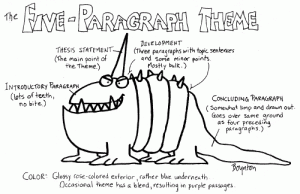 Almost everyone uses cliches at some stage in their writing – ideas that have been overused to the point of being completely boring, obvious and predictable. When you sit down in front of a blank piece of paper the first ideas that pop into your head will more than likely be very similar to the first ideas that pop into the heads of the other 12,000 odd students who choose the same essay topic or question B that you have.
Almost everyone uses cliches at some stage in their writing – ideas that have been overused to the point of being completely boring, obvious and predictable. When you sit down in front of a blank piece of paper the first ideas that pop into your head will more than likely be very similar to the first ideas that pop into the heads of the other 12,000 odd students who choose the same essay topic or question B that you have.
So how do you make your writing stand out? How do you spark some originality in the pressure cooker of the exam hall?
In my opinion half the battle is to move away from a focus on WHAT you’re saying and think more about HOW you’re saying it. Focus on your technique.
Take for example the question we did in class today: you have recently been asked to write a letter to the Department of Education & Science offering your opinion on what makes a good teacher. Certain cliches will pop into your head – classroom control, hard-working, passionate about their subject, patience, good communication & people skills, innovative approach to learning.
So far all we have is a list. It’s a fairly obvious list and most people would agree with it as a starting off point. But we have not yet said ANYTHING original. Now look at the following examples, one irritatingly informal and full of cliches and generalisations, the other quite witty, entertaining and enjoyable to read.
Example 1 = I am a leaving certificate student and in my opinion if a teacher wants to be good at their job they need to relate to what their students are going through. I mean not all of us have an easy life and sometimes when teachers get on our backs about stupid stuff like homework it just really annoys us. So yeah, I think being able to realise that students have a life outside of school and can’t always put school first is one thing that makes someone a good teacher.
In this example the student TELLS us their opinion and sounds like a bit of a whinger (look at the use of informal phrases such as ‘I mean’ ‘stupid stuff’ ‘so yeah‘) We probably agree with their ideas but we don’t feel like they’ve told us anything we don’t already know.
Example 2 = Let me illuminate for you the essence of the magic muinteoir. It’s Monday morning. I barely slept last night. My beautiful niece Saoirse (daughter of my brain-dead sister who got knocked up at 16) is teething and let’s just say our house isn’t on Wisteria Lane. Paper thin walls mean I arrive at school with the memory of her wails just fading. Then Alan, my super-gay best-friend decides to stick his leg out and trip me in the corridor (in front of Peter, school ride). How funny. I arrive late to first class. Crap… No hold on, it’s ok. It’s Biology. Mr. Watts senses intuitively that it’s been a bad day, a bad week, hell a bad year. He sidles quietly down to my seat, fills me in on what the rest of the class are quietly doing in pairs, offers to help me catch up and doesn’t blow a gasket that I don’t have my homework done – but does insist that he gets it tomorrow. Here is a safe haven from the madness that is my life & even though I’m tired I want to learn. Is this essence something you can capture? Or sell? Or even fully understand? Maybe all great teachers are just hard-wired this way. Understanding is part of their nature & learning is their bible.
In this example the writer DRAWS US IN to their experience of good teaching. They set the scene through the senses : sights, sounds, touch (being tripped) and draw us in emotionally by describing their feelings (How funny… Crap…). They give the teacher a believable identity by offering his name & subject, then describe his behaviour in detail. We are sucked into the moment because the writer proves his point using a specific anecdote instead of just making bland factual statements. It ends with 3 rhetorical questions which link back to the question being asked and a dramatic statement which uses hyperbole – hard-wired/nature/bible. The second example also stays focused perfectly on the task at hand – nobody asked you to slag off ‘bad’ teachers, the question asked you to explain/discuss/describe what it is that makes someone a good teacher. So example 1 wanders off point, example 2 sticks with the Q throughout.
By the way, I made up both of these examples so don’t be worrying that I’m going to publish something you’ve written up here. It’s not gonna happen – unless you write something amazing that just HAS to be published and if you do I’ll ask your permission first! Hope this helps rather than just telling you to be more original! Remember these two rules:
- SHOW DON’T TELL
- USE SPECIFIC EXAMPLES NOT GENERALISATIONS
 When you brainstorm you’ll often just have individual words written down but if you want to turn a word into a paragraph of prose how do you do it?
When you brainstorm you’ll often just have individual words written down but if you want to turn a word into a paragraph of prose how do you do it?





